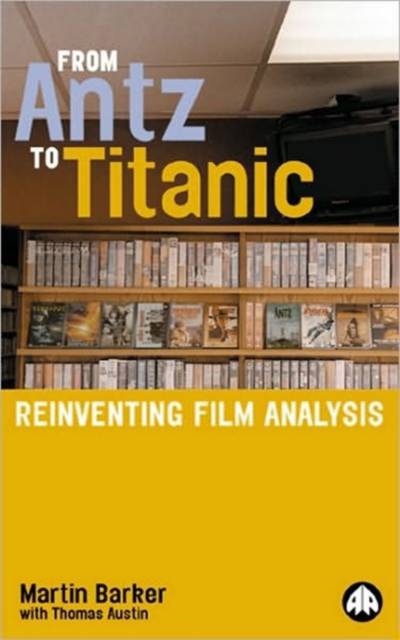
- Afhalen na 1 uur in een winkel met voorraad
- Gratis thuislevering in België vanaf € 30
- Ruim aanbod met 7 miljoen producten
- Afhalen na 1 uur in een winkel met voorraad
- Gratis thuislevering in België vanaf € 30
- Ruim aanbod met 7 miljoen producten
Zoeken
From Antz to Titanic: Reinventing Film Analysis
Reinventing Film Analysis
Martin Barker, Thomas Austin
Hardcover | Engels
€ 118,95
+ 237 punten
Omschrijving
Everybody analyses films. Ordinary viewers, chatting on the way home afterwards. Reviewers, telling us just enough to tempt or put off. Critics, 'situating' films for us. Moralists, hunting for the (harmful) message. So what exactly is it that film academics do that's different?Martin Barker and Thomas Austin provide a jargon-free, accessible and student-friendly introduction to film analysis. They begin with a discussion about audience and a detailed case-study on four conflicting analyses of Capra's It's A Wonderful Life. The authors examine a range of popular Hollywood films in a variety of genres, including Titanic, Deep Impact, Sleepless in Seattle, The Lion King, Starship Troopers and The Usual Suspects, and provide vivid demonstrations of what can and can't be achieved with close textual analysis. The book ends by proposing a list of measures for assessing the adequacy of film analyses: measures intended to lay the basis of a way of doing film analysis which goes beyond theoretically-predetermined and often obscurantist assertions.Explicitly rejecting much of the theoretical baggage that dogs contemporary film analysis, Barker and Austin strip the subject down to its bare essentials. The result is a provocative and timely reexamination of many of the basic tenets in film theory and analysis.
Specificaties
Betrokkenen
- Auteur(s):
- Uitgeverij:
Inhoud
- Aantal bladzijden:
- 240
- Taal:
- Engels
Eigenschappen
- Productcode (EAN):
- 9780745315843
- Verschijningsdatum:
- 20/08/2000
- Uitvoering:
- Hardcover
- Formaat:
- Genaaid
- Afmetingen:
- 135 mm x 220 mm
- Gewicht:
- 449 g

Alleen bij Standaard Boekhandel
+ 237 punten op je klantenkaart van Standaard Boekhandel
Beoordelingen
We publiceren alleen reviews die voldoen aan de voorwaarden voor reviews. Bekijk onze voorwaarden voor reviews.











